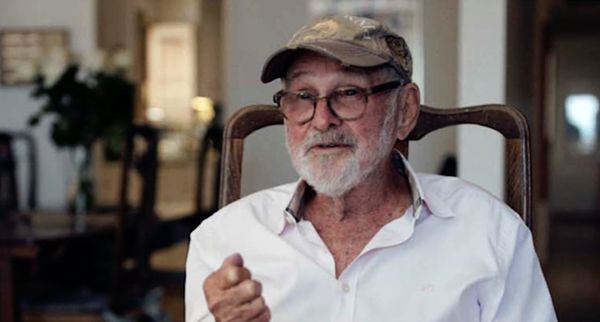Daniel Raim’s Fiddler’s Journey To The Big Screen, co-written with Michael Sragow, produced by Sasha Berman, executive produced by Matthew H. Bernstein and narrated by Jeff Goldblum, takes us on the remarkable odyssey of Norman Jewison and how he became the director of the multiple Oscar-winning Fiddler On The Roof.
 |
| Daniel Raim with Anne-Katrin Titze on Robert F Boyle: “He was my professor and I knew he loved Edward Hopper, so for Christmas I got him, when I was a student, a book on Hopper paintings.” |
On-camera interviews with Topol (who played Tevye, the part originally performed by Zero Mostel on the stage - we learn Danny Kaye and Frank Sinatra also coveted the film role), Rosalind Harris (Tzeitel), Michele Marsh (Hodel), Neva Small (Chava), composer John Williams (Oscar wins for George Lucas’s Star Wars, Steven Spielberg’s Schindler's List, E.T. the Extra-Terrestrial, Jaws, and Fiddler On The Roof), production designer Robert F Boyle (Alfred Hitchcock’s The Birds, Marnie, North By Northwest, Fiddler On The Roof), Sheldon Harnick (lyricist for Fiddler on the Roof), Kenneth Turan, and Jewison himself are artfully intertwined with clips from the film and behind the scenes folklore.
From Los Angeles, Daniel Raim joined me on Zoom for an in-depth conversation on Fiddler’s Journey To The Big Screen.
Anne-Katrin Titze: What a treasure trove your film is! Why did you choose to make a film about this one of all possible musical films?
Daniel Raim: It’s a great question. It’s a film that’s been dear to my heart on many levels since I first saw it at the age of 13. It was quite an important experience; I saw it in the living room of my grandparents. My great-grandparents did not survive the Holocaust. So when I was experiencing this movie for the first time with my grandparents it was almost like a window, a time machine in a way into their world.
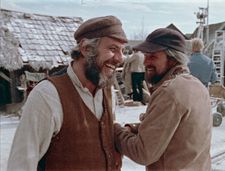 |
| Topol and Norman Jewison on the set of Fiddler On The Roof |
I was intrigued by the recreation of this world of Jewish life in Czarist Russia in 1905. And at the same time, curious about Jewish history and how the story of Fiddler on the Roof connects to my past. My family comes from Ukraine, so there’s complex layers. And ultimately just totally fascinated by the artistry that went into making that film.
AKT: Do you have family in Ukraine now?
DR: No, everybody left at the turn of the century.
AKT: There were moments while watching your film last week when the present jumped out from the screen. From the fact that Norman Jewison made a film called The Russians Are Coming the Russians Are Coming to the evacuation of the shtetl, there’s a lot there.
DR: There’s a lot there, absolutely.
AKT: Norman Jewison is a wonderful guide through the film. You include older interviews and then your own more recent interviews with him. How did that come about?
DR: My first interview with him was in 2000 or 1999. I was at the time graduating from the American Film Institute, making a documentary about my professor at the AFI, Robert Boyle, whom you meet in the movie and who is the production designer for Fiddler on the Roof and several Jewison films prior to Fiddler On The Roof.
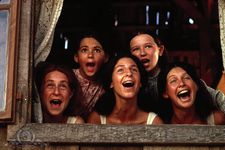 |
| Bielke (Candy Bonstein), Shprintze (Elaine Edwards), Tzeitel (Rosalind Harris), Hodel (Michele Marsh), and Chava (Neva Small) |
So for this movie, I went all the way back into my archive to pull out the original interviews I did with Robert Boyle and Norman. At that time in 2000 it was really the first time I was talking to the artists working behind the scenes on Fiddler. Then when his autobiography [This Terrible Business Has Been Good to Me] came out in 2015 I was really taken by his personal story, his journey that he shares. So within a year, the main spine of the film became this interview at his home in 2016.
AKT: Robert Boyle was the production designer on the most wonderful Hitchcock movies, The Birds and North By Northwest! Did he work on the Doris Day movies Send Me No Flowers and The Thrill of it All with Jewison?
DR: He may have worked on The Thrill of it All. I’d have to confirm that, though.
AKT: I thought of it because it’s that great mid-century, now referred to as Mad Men-style, of décor.
DR: Oh yeah. I think that was their first collaboration, The Thrill of it All, for Norman and Bob. And then they did The Russians Are Coming.
AKT: Let’s start with the three daughters in Fiddler, before we move on to Topol. These are great interviews! I think you get them all to sing! Tell me a bit about how you were structuring the film with the interviews!
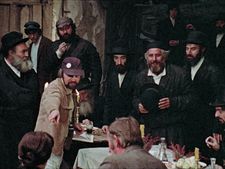 |
| Norman Jewison on set with the cast |
DR: Making a movie like this, I come into the interviews as a storytelling, not just like soundbites and talking heads and fun little anecdotes. I try to capture a three-dimensional portrait to understand for myself who are these lovely amazing actresses that infuse the film with such humanity and warmth and spirit. And what happened to them after Fiddler and where are they today? If it weren’t during the pandemic, I wish I could have done a vérité movie and followed them in their everyday life today. I think all three of them are so compelling and interesting.
AKT: They are!
DR: But it was during the height of the pandemic when I interviewed them. With Sheldon Harnick when I met him at his home in New York in 2017 I didn’t know he was such a good singer. He writes the lyrics, but I didn’t know he could kick out a beautiful rendition of Sunrise, Sunset, which is what he did. That kind of inspired asking the actresses to continue that theme. I think the audience enjoys a little break from the “narrative” and just basks in their voices and to see them singing. I think it’s a beautiful way to humanize them.
AKT: Getting anyone you interview to sing is the best! You even get Jeff Goldblum, you’re narrator, to sing. He couldn’t resist, could he?
 |
| Tevye (Topol) with Chava (Neva Small) |
DR: He couldn’t resist, right! He definitely couldn’t resist and I think that’s great. He made it his own a little bit there.
AKT: How did you decide on him for the narration?
DR: There was an article when I was thinking about the different possible narrators for this film. There was an article that came out around that time that he kind of impromptu sang Sunrise, Sunset at a park at a couple getting married under a chuppah in Brooklyn. He just walked by and that’s so Jeff Goldblum. And I realized he certainly has an affection for Fiddler on the Roof. I love him as an artist, as an actor, as a communicator and felt that he could really bring a dimension to this story that could be really beautiful.
AKT: I loved the part about who was supposed to play Tevye. Danny Kaye - you have a clip of him singing the Matchmaker song. And then Frank Sinatra’s manager showed interest! Crazy, crazy casting stories! And also not wanting Zero Mostel from the Broadway production because he was “too much” and how the role came to Topol. Did you know all of this or did it come up during recent research?
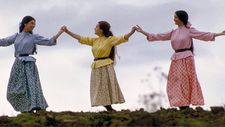 |
| Tzeitel (Rosalind Harris), Hodel (Michele Marsh), and Chava (Neva Small) |
DR: I had known a lot. Until I talked with Norman I didn’t know that Frank Sinatra’s manager had called Norman. And Danny Kaye, what a great story! It’s really interesting how Danny Kaye wined and dined Norman, you know, really tried to get the part. But Norman had a vision and it was really beautiful to investigate not just Norman’s vision but to talk with film critic Kenny Turan who could share his point of view why Zero Mostel was so great on Broadway and what were Sholem Aleichem’s intentions for the character, an Eastern European dairyman.
And then versus Topol, an Israeli. All these dynamics were beautifully conveyed by the different interviews so that we could create a balance and show different points of view. Later after making the film I learned that everyone in Hollywood expected Zero Mostel to play the part and it was kind of a big blow to him.
AKT: Another beautiful job in editing by you is when you talk about where musicals were at at the time. You show a quick clip of The Sound Of Music and then there were all those actors who couldn’t hold a tune and we see Clint Eastwood in Paint Your Wagon. Then come singers who couldn’t act and we see the actor who was the leprechaun in Finian’s Rainbow. Did you have fun doing these parts of the film?
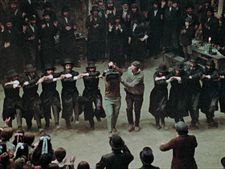 |
| Fiddler On The Roof Oscar-winning cinematographer Oswald Morris shooting the scene |
DR: Thank you. Yeah, absolutely. I co-wrote the documentary script with film critic Michael Sragow, so he had a point of view of film history. It was fun to explore what the makers of the Fiddler movie version were up against in the late Sixties. After the huge success of The Sound of Music the musical genre in Hollywood was certainly not doing great and it was fun to show that contrast. And it also points to how beautiful Norman’s storytelling is. Even John Williams says: we weren’t looking for three actresses that could sing beautifully; we were looking for three village girls.
AKT: That’s lovely.
DR: And all the creative minds like John Williams and Norman Jewison - just to hear how they were thinking about the casting.
AKT: It’s fascinating also to get the biographical insights for Norman Jewison. When he says “I always wanted to be Jewish.” He talks about school and that there were only two Jewish boys. Then he mentions only one and himself, although he wasn’t Jewish! This is a thread throughout the whole film, to meeting Golda Meir and on and on. A constant chase in a way.
DR: I think it weighed heavy on him, the fact that he was hired to direct Fiddler On The Roof and not being Jewish. And yet, he had this cultural connection because of his name, this almost spiritual connection because of his last name. Those childhood experiences that inform us, right? In his case, his best friend and he would go to the synagogue and he experienced this cultural and spiritual connection to Judaism.
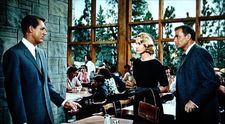 |
| Cary Grant, Eva Marie Saint and James Mason in North By Northwest, production design by Robert F Boyle |
And then when making Fiddler I think he was at the height of his creative and artistic powers in Hollywood as an A-list director. It was also the time when he was at a spiritual crisis in his inner life, in the sense that John F Kennedy and Martin Luther King, and then his friend Bobby Kennedy were assassinated. He was feeling sort of lost and then - he has the opportunity to direct Fiddler On The Roof! And he travels to Israel and starts to meet with survivors of the pogroms and survivors of the Holocaust and really gets inside of the material of Fiddler On The Roof through the prism of his own care and concern and humanism. And I think that lifted him up again in a period of his life when he felt really crushed and lost.
Then he finishes Fiddler and then his next movie, he calls it “one for the goyim”, Jesus Christ Superstar. He is summoned by Ben-Gurion for a visit and there’s that beautiful exchange that is the climax of the film. It’s such a great coming full circle for Norman.
AKT: Tradition is not just a song and the subject of Fiddler, but there are also the different cinematic traditions, traditions of writing. Tradition is really the word for your film as well, right?
DR: Thank you for saying that. That’s really interesting to hear. I didn’t think about it in those terms but I appreciate that.
 |
| Tzeitel (Rosalind Harris) marrying Motel (Leonard Frey) under the chuppah |
AKT: You are working on a film about Ozu, talking about tradition? Japanese tradition?
DR: Oh my gosh, yeah absolutely. In terms of thematic tensions in his films, like modernity versus tradition and also thematically connected to the disillusion of a family in many of Ozu’s postwar films. And of course Tevye and his daughters and those tensions.
AKT: Fathers and daughters are all over Ozu, of course.
DR: There’s something there!
AKT: There’s something there, definitely. I saw you made a film about Hitchcock and Hopper.
DR: I did. It was a short film for the Criterion Collection and - again - it’s a discussion with Robert Boyle, the production designer of Fiddler On The Roof and North By Northwest, The Birds, Marnie, Saboteur, Shadow of a Doubt. He was my professor and I knew he loved Edward Hopper, so for Christmas I got him, when I was a student, a book on Hopper paintings.
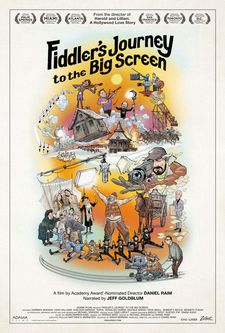 |
| Fiddler’s Journey To The Big Screen opens at the Angelika Film Center in New York on Friday, April 29 |
I had my camera and he started to go through each page, each painting in the book, and shared with me an insight that I never really heard of before. Which is the idea that the artist, going all the way back to the great painters, Michelangelo, Leonardo Da Vinci and all the way to Hopper and Hitchcock, is what is interesting is not the climax, the big event, but the moment before. The humanity, the tension before the climax, what he referred to as the penultimate moment.
And looking at Hopper, these are all these penultimate moments. And understanding how a production designer can contribute through storyboarding these penultimate moments for Hitchcock and incorporating cinema language into the visual arts - it was such a beautiful revelation. Thank you for asking about that.
AKT: Did you see the Bix Beiderbecke film that just got re-released? It has a lot of Hopper paintings in it.
DR: Is that the Wim Wenders film?
AKT: No, Wim’s project was something different. The one I am talking about was made in the Eighties. I spoke with the director and she told me about how she used a lot of Hopper paintings to illustrate the music. Also about the penultimate moment - that’s also Coco Chanel, who said that it’s much more interesting getting dressed before going out than the event itself.
DR: It’s the moment before. That’s great!
AKT: Thank you so much for a beautiful film
DR: Thank you! Very nice to meet you. Take care!
Fiddler’s Journey To The Big Screen opens at the Angelika Film Center in New York on Friday, April 29. Daniel Raim along with Neva Small and Rosalind Harris will participate in Q&As following the 7:25pm screenings on April 29 and April 30.








